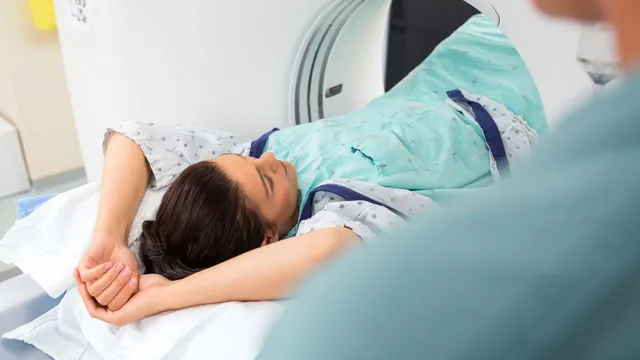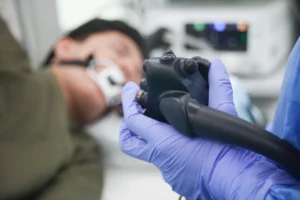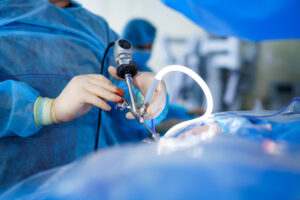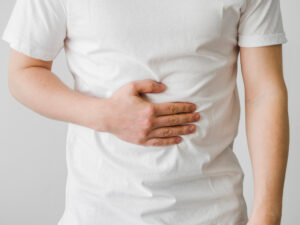Key pointers:
- A CT (computed tomography) scan provides clear cross-sectional images of the digestive organs.
- It helps detect problems such as appendicitis, intestinal obstruction, liver disease, or tumours.
- The procedure is painless and usually quick, often completed within 10–30 minutes.
- Knowing what to expect before, during, and after the scan helps ease concerns.
- Results are reviewed by your doctor to guide further treatment or follow-up tests.
What Exactly Is a CT Scan?
A CT scan uses X-rays and computer technology to create detailed images of internal organs and tissues. Unlike a regular X-ray, which gives a single flat image, a CT scan captures multiple angles to build a 3-D view of your abdomen.
For digestive health, it’s often recommended when your doctor needs a closer look at organs like the stomach, intestines, liver, pancreas, and spleen, especially when other tests, such as ultrasound or blood work, don’t give enough information.
When a CT Scan May Be Needed
CT scans are valuable tools for identifying both urgent and chronic conditions that affect the digestive tract. Some common reasons your doctor may suggest one include:
- Abdominal pain or swelling: To rule out appendicitis, intestinal obstruction, or inflammatory bowel disease.
- Liver and gallbladder issues: To detect fatty liver, cirrhosis, cysts, or gallstones.
- Pancreatic or biliary conditions: To assess pancreatitis or possible blockages in bile ducts.
- Suspected tumours or growths: To evaluate any masses or abnormal tissue seen in other imaging.
- Post-surgical monitoring: To check for complications such as abscesses or internal bleeding.
What Happens Before the Scan
Before your CT scan, you’ll receive instructions depending on which part of your digestive system is being examined. You may be asked to:
- Avoid eating or drinking for a few hours.
- Change into a medical gown and remove metal objects like jewellery or belts.
- Drink a contrast liquid to make your stomach or intestines more visible on the scan (for certain cases).
If contrast dye is used through a vein, the radiographer will explain what to expect, usually a brief warm sensation or metallic taste that fades quickly.
What to Expect During the Scan
During the procedure, you’ll lie on a narrow table that slides into a short, ring-shaped scanner. The machine rotates around you, taking images from different angles.
- The scan itself is painless.
- You may hear soft whirring sounds from the machine.
- It’s important to stay still, and sometimes you’ll be asked to hold your breath for a few seconds to ensure clear images.
The entire process usually takes 10 to 30 minutes, depending on whether contrast dye is used.
After the Scan: What Happens Next
Most patients can return to normal activities immediately after a CT scan. If contrast dye was given, you may be advised to:
- Drink plenty of water to help flush the dye out of your system.
- Inform your doctor if you experience any allergic symptoms (which are rare).
Is a CT Scan Safe?
CT scans use a small amount of radiation, typically well within safe limits. Your doctor only recommends one when the benefits outweigh any risks. For pregnant women or those with kidney problems, alternative tests may be considered.
FAQs About CT Scans for Gastrointestinal Problems
1. How is a CT scan different from an MRI or ultrasound?
A CT scan uses X-rays for a quick and detailed view, especially of bones and internal organs. MRI uses magnetic fields (without radiation), while ultrasound uses sound waves.
2. Will the scan hurt or feel uncomfortable?
No. The scan is painless. You’ll just need to lie still for a short period.
3. Do I always need a contrast dye?
Not always. Contrast dye is only used if the doctor needs clearer images of blood vessels or certain organs.
4. How soon will I get the results?
The radiologist usually reviews the images within the same day or shortly after, and your doctor will discuss the findings during your next appointment.
When to Discuss a CT Scan with a Gastroenterologist
If you’ve been experiencing ongoing abdominal pain, bloating, unexplained weight loss, or digestive changes, a CT scan might help uncover the cause.
At GastroClinic, Dr Lin Cui Li, American Board-Certified Gastroenterologist and Hepatologist, provides comprehensive evaluation and management for digestive conditions. She works closely with radiology partners to ensure patients receive appropriate investigations, including CT scans when indicated.
- 3 Mount Elizabeth, #06-10, Mount Elizabeth Medical Centre, Singapore 228510
- Call us at 6443 8166
- WhatsApp 8040 7375
- Book an Appointment
Don’t ignore persistent digestive discomfort. Talk to our team to find out whether a CT scan or other assessment is right for you, and take the next step toward better digestive health.













